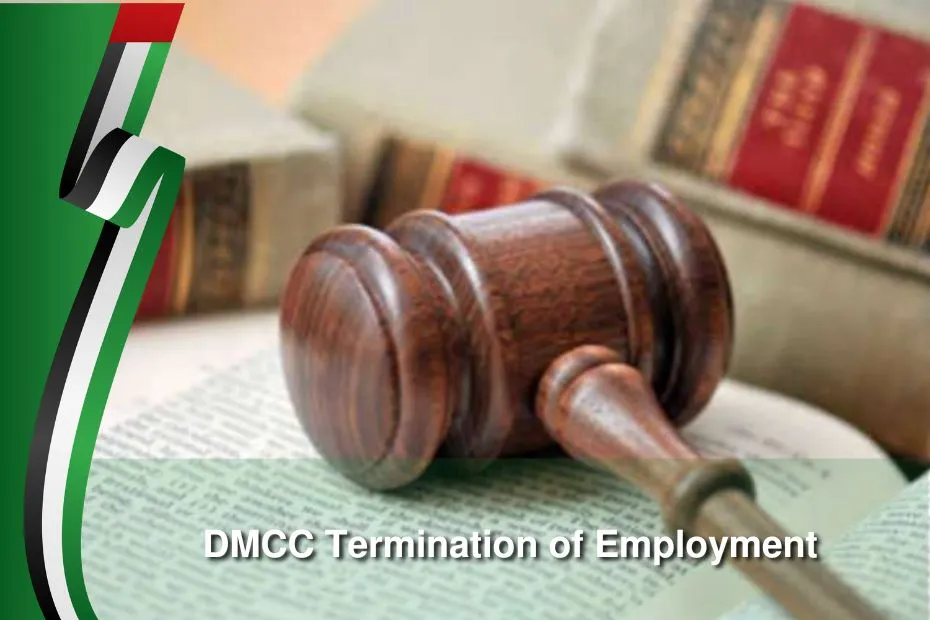DMCC termination of employment is governed by the UAE Federal Decree-Law No. 33 of 2021, which provides a clear framework for employers and employees.
The law sets forth specific rules and procedures that ensure both parties handle employment terminations fairly and in accordance with legal guidelines.
This article offers a comprehensive look at the key aspects of employment termination in DMCC, helping you understand the process and your legal rights in 2025.
Contact our expert lawyers & legal consultants in UAE. Click the WhatsApp icon below.
Table of Contents
Legal Insights for DMCC Termination of Employment
Under the UAE Federal Decree-Law No. 33 of 2021, termination of employment in the DMCC Free Zone must comply with several critical rules.
These rules are designed to protect the rights of both employers and employees during the termination process.
Valid Grounds for Employment Termination
Employers must have a legitimate reason to terminate an employee’s contract, including mutual agreement, contract expiration, the employee’s death, company closure, insolvency, or serious misconduct.
Any termination based on these valid grounds should be conducted following legal procedures.
Understanding Notice Period Obligations
Both employers and employees must give notice in line with the terms outlined in the employment contract. Typically, the notice period ranges from 30 to 90 days.
If either party fails to provide the required notice, the other party must compensate the other party for the remaining notice period or its equivalent.
How End-of-Service Benefits Are Calculated?
Employees who have completed at least one year of service are entitled to end-of-service benefits. The gratuity is calculated based on the employee’s basic salary.
Employees are entitled to 21 days of basic salary for each year worked during the first five years, and 30 days of basic salary for each subsequent year.
Employers are obligated to pay these benefits and any outstanding wages within 14 days of terminating the employment contract.
Termination Due to Serious Misconduct
Employers can terminate an employee immediately without notice or compensation if the employee commits serious misconduct.
Examples include fraud, theft, repeated negligence, or safety violations. In these cases, the termination process is expedited to protect the integrity and safety of the workplace.
Implications of Work Permit Issues
If an employee fails to renew their work permit, and the failure is not the employer’s fault, the employer may terminate the contract.
This is a valid ground for dismissal under the law, especially if the employee’s continued employment becomes legally impossible.
Employer’s Payment Obligations After Termination
Employers must ensure that all wages, end-of-service benefits, and any other dues owed to the employee are settled within 14 days of the termination date.
Failure to do so may result in legal disputes or compensation claims.
Legal Assistance for Employment Termination in DMCC
Navigating the termination of employment within the DMCC Free Zone requires understanding both legal obligations and rights.
Whether you are an employer or an employee, it is crucial to ensure that the process is handled correctly to avoid disputes or violations of legal provisions.
Our legal services offer comprehensive support in all areas related to employment termination.
Supporting Employers Through the Termination Process
To help employers manage the termination process effectively, we offer services designed to ensure compliance and minimize disputes.
Here are the key services we provide:
- Legal Consultation: We provide expert guidance on valid grounds for employee termination and the legal processes that must be followed.
- Contract Drafting Assistance: Our legal team assists in drafting transparent and legally compliant termination clauses in employment contracts to avoid misunderstandings and disputes.
- Ensuring Compliance with Notice Periods: We help ensure that your organization meets the notice period and compensation obligations as the law requires.
- Dispute Resolution Support: Should a termination lead to a dispute, our legal team offers representation and assists with arbitration and conflict resolution.
Protecting Employee Rights During Termination
Understanding your rights and options when facing termination is crucial. Our services are designed to protect your interests and ensure you are treated fairly throughout the process.
Here are the key areas where we can assist you:
- Advising on Legal Rights: We advise on your legal rights related to termination, ensuring you receive the correct end-of-service benefits and are treated fairly in the termination process.
- Representation in Termination Disputes: We can represent you in legal proceedings if you face unfair termination or disagreements over gratuity payments.
- Guidance in Serious Misconduct or Work Permit Issues: We offer legal advice if your employment is terminated due to serious misconduct or failure to renew your work permit, ensuring that any wrongful dismissal is challenged.
Employers and employees can consult a legal professional to ensure the process complies with DMCC Labour Law Termination.
This avoids potential legal pitfalls and ensures fair treatment for all parties involved in the DMCC termination of employment.
FAQs about DMCC Job Termination
Conclusion about DMCC termination of employment.
UAE Federal Decree-Law No. 33 of 2021 regulates employment termination in the DMCC, ensuring fair and legal procedures for employers and employees.
Understanding the rules regarding valid grounds for termination, notice periods, and end-of-service benefits is crucial for avoiding disputes.
If you are an employer or an employee facing dismissal, seeking legal advice can help protect your rights and responsibilities.
Contact our law firm in UAE for expert help. Click the Whatsapp icon below.
Omar Al Mansoori is an Emirati legal advisor and researcher with over 10 years of experience in civil, commercial, and corporate law in the UAE. He focuses on simplifying complex legal topics and ensuring that every article published aligns with the latest national legislation and official regulations.
